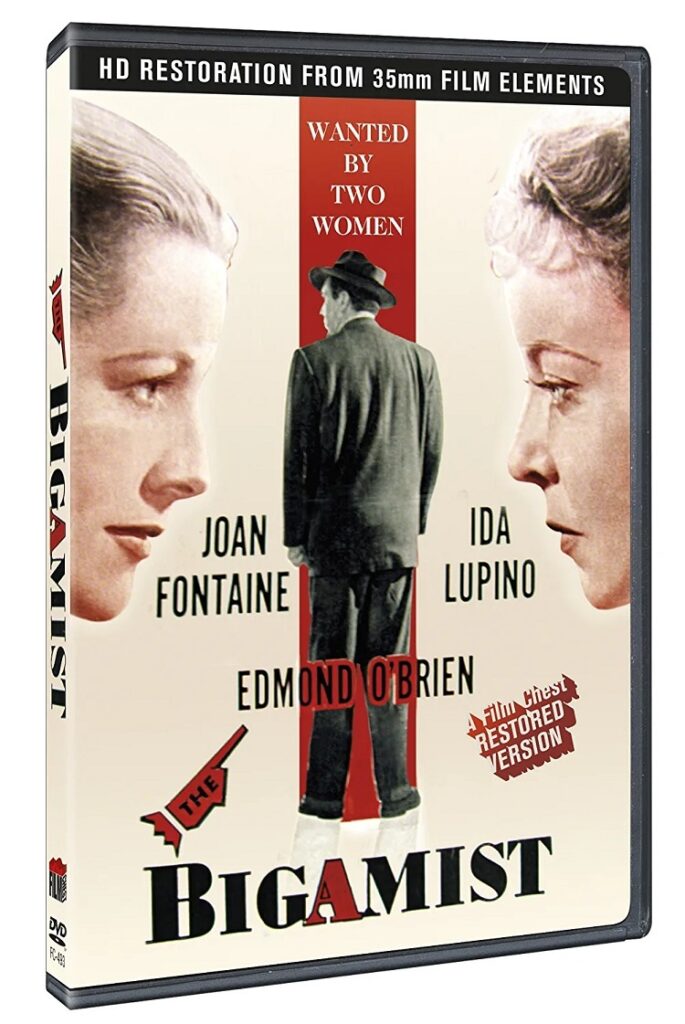
I must admit that my prurient interests were piqued by the title of The Bigamist (1953). This Ida Lupino-directed film has just been excavated and restored by the good people at Film Chest Media, and looked like a lot of fun. With a tagline like “Wanted by Two Women!” who could resist? As it turned out, The Bigamist is actually quite sympathetic to the subject of bigamy, if a bit melodramatic in tone.
The film opens with a beautiful shot of the Golden Gate Bridge, then zooms into the office of an adoption agency. Harry Graham (Edmond O’Brien) and his wife Eve (Joan Fontaine) are meeting with Mr. Jordan (Edmund Gwenn), the agent in charge of their adoptive efforts. The couple own what appears to be a very profitable business, are both in their 30s, and seem to have no other problems besides the fact that Eve cannot bear children. In short, they seem like perfect candidates. Still, Mr. Jordan is a cautious man who takes his job very seriously and has them sign papers authorizing him to look in to their backgrounds.
They both sign, but Harry is clearly uncomfortable about it. As Mr. Jordan discovers, there is good reason for this. While Eve holds down the fort in San Francisco, Harry travels to Los Angeles quite frequently to tend to accounts. We all know about those traveling salesmen, and this is where I expected things to get risqué. And they do, sort of. But what follows is really a love story rather than the sexual frenzy I had anticipated.
Harry has a day to kill, and of all the possible things to do in L.A., he boards a Grey Line bus for a tour of Beverly Hills. We are along for the ride as the driver points out the homes of Louella Parsons, Jimmy Stewart, Jack Benny, and (of all people) Edmund Gwenn. I thought this was a pretty cute little inside joke at first, but the moment is actually kind of pivotal to the story. When the bus driver mentions that Gwenn starred in Miracle on 34th Street (1947), Harry leans over to the woman across the aisle and mentions how much he liked that film. The woman he meets is named Phyllis Martin (Ida Lupino), and they immediately hit it off.
It is hard not to like Miss Martin. In a way, she reminds me of Piper Laurie as Sarah in The Hustler (1961), minus the alcohol. She obviously has some baggage, but her quirky ways just make her all the more adorable. When Harry asks her why she rides the tour bus when she lives in L.A. anyway, she says that it is better than walking. When the ride is over and they are about to part ways, she asks him if he likes Chinese food. She takes him to a restaurant, makes him wait at a table, then reappears in a waitress uniform, and a tray of food for him. Turns out she works there.
Harry sees her every time he comes to town, and she never asks him about his life. Maybe she did not want to know if he was married, so they just enjoy each other’s company, with no strings attached. Things go along like this for a while, and then Harry finds himself forced to stay over on his birthday. He calls his wife, and even confesses that he is having an affair, but she just laughs it off and wants to talk about the business. Poor guy.
Harry takes Phyllis out dancing, and the big moment comes during the film’s musical highlight, a Bing Crosby-type ballad titled “It Wasn’t the Stars That Thrilled Me.“ Harry leans into Phyllis’ ear and tells her that he will be leaving the next day, and she replies “Tomorrow is a long way off.”
Harry gets stuck in S.F. for the next few months, and does not see Phyllis again for quite a while. When he does, he discovers that she is carrying his child. She tells him that she can take care of herself, that she does not need his help. She does not want to trap him. Meanwhile, Eve’s father has just died, and Harry cannot bring himself to further hurt her by telling her about Phyllis. So he marries Phyllis and is now a bigamist.
All of this comes out as a confession when Mr. Jordan unexpectedly knocks on the door of Mr. and Mrs. Harrison Graham of Los Angeles. He had his suspicions, and does not seem very surprised when Harry answers the door. Harry’s story that he is just staying with a friend while in town kind of falls apart when the baby starts crying.
The final scene is in a courtroom, with a judge pondering the situation. Harry’s attorney argues that if he had carried on with Phyllis as his mistress, the whole thing would have been treated with a wink and a nod. But by giving the child a name, and actually marrying the mother, he is guilty of a crime. The film ends there, with the verdict and/or sentence hanging in the air.
As I mentioned, The Bigamist is a bit on the melodramatic side, but it is definitely not the campy film I had expected. That final message is actually very thought-provoking and is as valid today as it was in 1953. Not that I am condoning bigamy, mind you. The vintage scenes of both cities are marvelous, especially the old Bunker Hill area of L.A., where Phyllis lived when Harry first met her. All in all, The Bigamist is a very good movie, and my hat is off to Film Chest for restoring it.